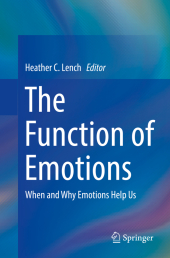 Neuerscheinungen 2018Stand: 2020-02-01 |
Schnellsuche
ISBN/Stichwort/Autor
|
Herderstra▀e 10
10625 Berlin
Tel.: 030 315 714 16
Fax 030 315 714 14
info@buchspektrum.de |

Heather C. Lench
The Function of Emotions
When and Why Emotions Help Us
Herausgegeben von Lench, Heather C.
1st ed. 2018. 2018. xv, 267 S. 1 SW-Abb., 5 Farbabb., 60 Farbtabellen. 235 mm
Verlag/Jahr: SPRINGER, BERLIN; SPRINGER INTERNATIONAL PUBLISHING 2018
ISBN: 3-03-002636-1 (3030026361)
Neue ISBN: 978-3-03-002636-3 (9783030026363)
Preis und Lieferzeit: Bitte klicken
This eye-opening text brings together research from behavioral science, neuroscience, and other fields to make a cogent case for emotions acting as a practical framework for living our lives. A dozen basic emotions are analyzed in terms of what causes them, how they change thoughts and behaviors, and the functional value of these responses. Contrary to the common idea of emotions as fleeting occurrences, they are shown as having the potential for lasting impact on moods, thoughts, and behaviors. Intriguing findings assert that even negative emotions such as jealousy and anger can have positive results such as promoting positive goals, and can lead to successful outcomes in overarching domains such as cognition and well-being.
Among the topics covered:
˙ How fear and anxiety promote attention and protective behavior.
˙ How sadness and depression promote analysis of complex problems in goal-pursuits.
˙ How happiness promotes processing and attention.
˙ How love promotes relationship development and goal attainment.
˙ How pride promotes sense of self and identity.
The Function of Emotions is a valuable resource for students, researchers, and clinicians interested in the psychology and neuroscience of emotions and their function in everyday life. It will attract an interested readership among professionals working in such fields as education, management and leadership, social work, and psychotherapy.
1 Functional Theory Heather Lench, Texas A&M University, Department of Psychology Functional theories of emotion, contrast these theories with different approaches to emotion, coverage of ongoing debates about emotion, lay out questions addressed by the book
2 Fear & Anxiety Rebecca Ferrer, University of Connecticut, National Institutes of Health How fear and anxiety promote attention and protective behaviors, effects on health behaviors and cognition
3 Anger Jennifer Lerner, Harvard University, Public Policy & Management How anger promotes motivation and goal-attainment, effects in business and marketing settings
4 Sadness Paul Andrews, McMaster University, Department of Psychology, Neuroscience, & Behavior How sadness and depression promote analysis of complex problems in goal pursuits, effects on well being and cognition.
5 Happiness Justin Storbeck, Queens College, CUNY, Department of Psychology How happiness promotes processing and attention, effects on relationships and cognition
6 Love & Desire Stephanie Cacioppo, The University of Chicago, Department of Psychiatry and Behavioral Neuroscience How love and desire promote relationship development and goal attainment, effects on well-being and cognition
7 Jealousy Norman Li, Singapore Management University How jealousy facilitates relationship functioning
8 Pride June Tangney, George Mason University, Department of Psychology How pride promotes sense of self and identity, effects on social relationships and actions
9 Boredom James Danckert, University of Waterloo, Department of Psychology How boredom promotes goal seeking and exploration, effects in educational settings and on cognition
10 Disgust Debra Lieberman, University of Miami, Department of Psychology How disgust promotes protection of goals and social groups, effects on moral decisions, cognition, and political choice
11 Regret Marcel Zeelenberg, Tilburg University, Department of Social Psychology How regret promotes decision making and goal-pursuits, effects on cognition and on economic choices
12 Awe Lani Shiota, Arizona State University, Department of Psychology How awe promotes self-expansion and pro-social behaviors, effects on relationships and creativity


